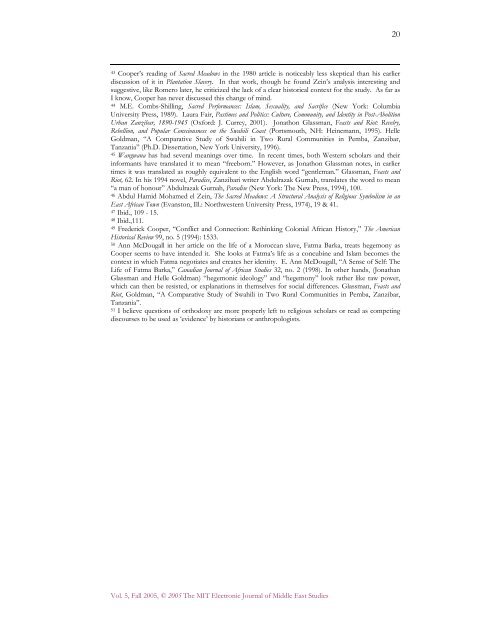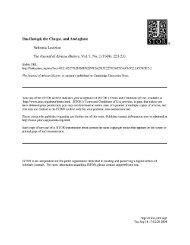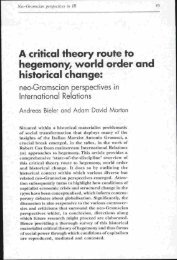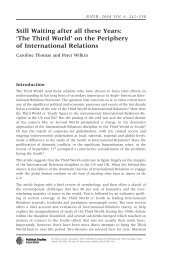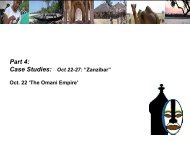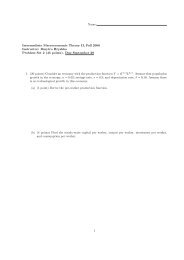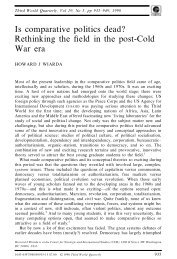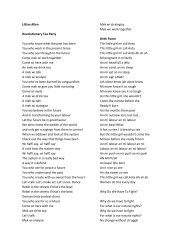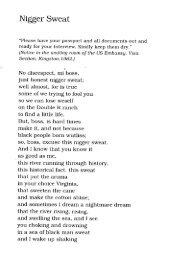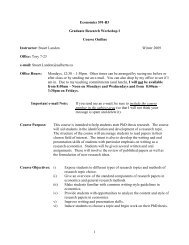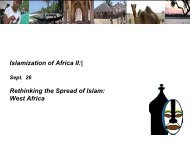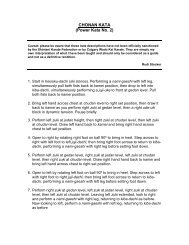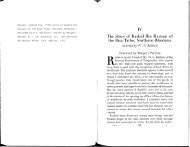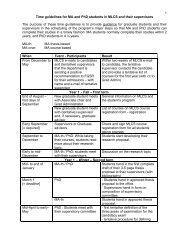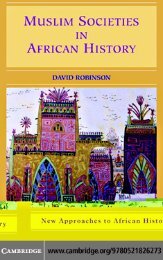personal memories revolutionary states and indian ocean migrations
personal memories revolutionary states and indian ocean migrations
personal memories revolutionary states and indian ocean migrations
Create successful ePaper yourself
Turn your PDF publications into a flip-book with our unique Google optimized e-Paper software.
43 Cooper’s reading of Sacred Meadows in the 1980 article is noticeably less skeptical than his earlier<br />
discussion of it in Plantation Slavery. In that work, though he found Zein’s analysis interesting <strong>and</strong><br />
suggestive, like Romero later, he criticized the lack of a clear historical context for the study. As far as<br />
I know, Cooper has never discussed this change of mind.<br />
44 M.E. Combs-Shilling, Sacred Performances: Islam, Sexuality, <strong>and</strong> Sacrifice (New York: Columbia<br />
University Press, 1989). Laura Fair, Pastimes <strong>and</strong> Politics: Culture, Community, <strong>and</strong> Identity in Post-Abolition<br />
Urban Zanzibar, 1890-1945 (Oxford: J. Currey, 2001). Jonathon Glassman, Feasts <strong>and</strong> Riot: Revelry,<br />
Rebellion, <strong>and</strong> Popular Consciousness on the Swahili Coast (Portsmouth, NH: Heinemann, 1995). Helle<br />
Goldman, “A Comparative Study of Swahili in Two Rural Communities in Pemba, Zanzibar,<br />
Tanzania” (Ph.D. Dissertation, New York University, 1996).<br />
45 Wangwana has had several meanings over time. In recent times, both Western scholars <strong>and</strong> their<br />
informants have translated it to mean “freeborn.” However, as Jonathon Glassman notes, in earlier<br />
times it was translated as roughly equivalent to the English word “gentleman.” Glassman, Feasts <strong>and</strong><br />
Riot, 62. In his 1994 novel, Paradise, Zanzibari writer Abdulrazak Gurnah, translates the word to mean<br />
“a man of honour” Abdulrazak Gurnah, Paradise (New York: The New Press, 1994), 100.<br />
46 Abdul Hamid Mohamed el Zein, The Sacred Meadows: A Structural Analysis of Religious Symbolism in an<br />
East African Town (Evanston, Ill.: Northwestern University Press, 1974), 19 & 41.<br />
47 Ibid., 109 - 15.<br />
48 Ibid.,111.<br />
49 Frederick Cooper, “Conflict <strong>and</strong> Connection: Rethinking Colonial African History,” The American<br />
Historical Review 99, no. 5 (1994): 1533.<br />
50 Ann McDougall in her article on the life of a Moroccan slave, Fatma Barka, treats hegemony as<br />
Cooper seems to have intended it. She looks at Fatma’s life as a concubine <strong>and</strong> Islam becomes the<br />
context in which Fatma negotiates <strong>and</strong> creates her identity. E. Ann McDougall, “A Sense of Self: The<br />
Life of Fatma Barka,” Canadian Journal of African Studies 32, no. 2 (1998). In other h<strong>and</strong>s, (Jonathan<br />
Glassman <strong>and</strong> Helle Goldman) “hegemonic ideology” <strong>and</strong> “hegemony” look rather like raw power,<br />
which can then be resisted, or explanations in themselves for social differences. Glassman, Feasts <strong>and</strong><br />
Riot, Goldman, “A Comparative Study of Swahili in Two Rural Communities in Pemba, Zanzibar,<br />
Tanzania”.<br />
51 I believe questions of orthodoxy are more properly left to religious scholars or read as competing<br />
discourses to be used as ‘evidence’ by historians or anthropologists.<br />
Vol. 5, Fall 2005, © 2005 The MIT Electronic Journal of Middle East Studies<br />
20


